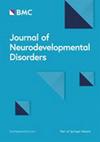Social skills in neurodevelopmental disorders: a study using role-plays to assess adolescents and young adults with 22q11.2 deletion syndrome and autism spectrum disorders
IF 4.1
2区 医学
Q1 CLINICAL NEUROLOGY
引用次数: 0
Abstract
Social skills are frequently impaired in neurodevelopmental disorders and genetic conditions, including 22q11.2 deletion syndrome (22q11DS) and autism spectrum disorders (ASD). Although often assessed with questionnaires, direct assessment provides a more valid estimate of the constructs. Role-plays (i.e., simulates situational settings) therefore appear to be an appropriate indicator of social skills in daily life. This co-registered study involved 53 individuals with 22q11DS, 34 individuals with ASD, and 64 typically developing (TD) peers aged 12–30 years. All participants were assessed with role-plays as well as parent-reported questionnaires and clinical interviews focusing on social skills, functioning and anxiety. Both clinical groups showed impaired social skills compared to TD, but distinct social profiles emerged between the groups. Individuals with 22q11DS displayed higher social appropriateness and clarity of speech but weaker general argumentation and negotiation skills, with the opposite pattern observed in participants with ASD. No association was found between social skills measured by direct observation and caregiver reports. Social anxiety, although higher in clinical groups than in TD, was not associated with role-plays. This study highlights the need to train social skills through tailored interventions to target the specific difficulties of each clinical population. It also highlights the importance of combining measures as they do not necessarily provide the same outcome.神经发育障碍中的社交技能:利用角色扮演评估 22q11.2 缺失综合征和自闭症谱系障碍青少年的研究
神经发育障碍和遗传性疾病(包括 22q11.2 缺失综合症(22q11DS)和自闭症谱系障碍(ASD))常常会影响社交能力。虽然通常采用问卷调查的方式进行评估,但直接评估能更有效地估测这些构念。因此,角色扮演(即模拟情景设置)似乎是日常生活中社交技能的一个适当指标。这项共同登记的研究涉及 53 名 22q11DS 患者、34 名 ASD 患者和 64 名 12-30 岁的典型发育(TD)同龄人。所有参与者都接受了角色扮演以及家长报告问卷和临床访谈的评估,重点关注社交技能、功能和焦虑。与 TD 相比,两个临床组都显示出社交技能受损,但两组之间出现了不同的社交特征。22q11DS 患儿的社交适当性和言语清晰度较高,但一般的辩论和协商能力较弱,而 ASD 患者的情况则恰恰相反。通过直接观察测量的社交技能与护理人员的报告之间没有关联。虽然临床组的社交焦虑高于TD组,但与角色扮演无关。这项研究强调,有必要针对每个临床人群的具体困难,通过量身定制的干预措施来训练社交技能。它还强调了综合测量的重要性,因为它们并不一定提供相同的结果。
本文章由计算机程序翻译,如有差异,请以英文原文为准。
求助全文
约1分钟内获得全文
求助全文
来源期刊
CiteScore
7.60
自引率
4.10%
发文量
58
审稿时长
>12 weeks
期刊介绍:
Journal of Neurodevelopmental Disorders is an open access journal that integrates current, cutting-edge research across a number of disciplines, including neurobiology, genetics, cognitive neuroscience, psychiatry and psychology. The journal’s primary focus is on the pathogenesis of neurodevelopmental disorders including autism, fragile X syndrome, tuberous sclerosis, Turner Syndrome, 22q Deletion Syndrome, Prader-Willi and Angelman Syndrome, Williams syndrome, lysosomal storage diseases, dyslexia, specific language impairment and fetal alcohol syndrome. With the discovery of specific genes underlying neurodevelopmental syndromes, the emergence of powerful tools for studying neural circuitry, and the development of new approaches for exploring molecular mechanisms, interdisciplinary research on the pathogenesis of neurodevelopmental disorders is now increasingly common. Journal of Neurodevelopmental Disorders provides a unique venue for researchers interested in comparing and contrasting mechanisms and characteristics related to the pathogenesis of the full range of neurodevelopmental disorders, sharpening our understanding of the etiology and relevant phenotypes of each condition.

 求助内容:
求助内容: 应助结果提醒方式:
应助结果提醒方式:


